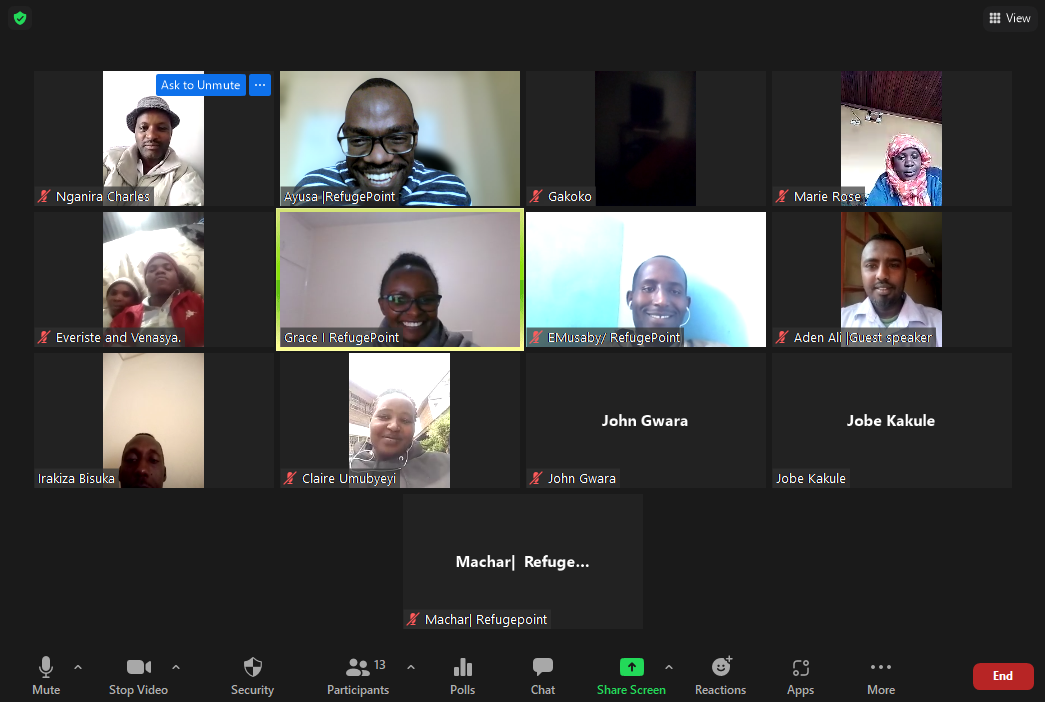By Grace Ndirangu, Livelihoods Program Manager
In March 2020, the Kenyan government declared a lockdown after the first COVID-19 case was reported in Nairobi. Most organizations, including RefugePoint, immediately pivoted to remote work. We also put field activities on hold to reduce exposure to clients. After some time, we found ways to continue implementing the vital everyday activities we once did in-person.
RefugePoint reinstated the Business Development Skills (BDS) training and Business Strengthening Workshop (BSW) activities after ensuring compliance with the Kenyan Ministry of Health guidelines. The BDS training is now conducted under a blended model combining face-to-face and virtual sessions. We have face-to-face training sessions for a few clients who do not have access to smartphones and require translation services to their native languages. Physical distancing is observed during the face-to-face class, and any group work activities follow strict physical distancing protocols.
We hold a digital BDS class for most of our clients who do not need translation services and have access to smartphones. The digital class involves preparing the clients by working with RefugePoint Community Navigators to organize the clients by making calls to confirm their availability for the training and confirming whether the clients have smartphones. After this is done, the clients are then added to a WhatsApp group for ease of communication. The group is also used to share Zoom links and documents clients use during the training.The clients also have a chance to orient themselves with the Zoom platform before the actual training.
We have learned a lot of valuable lessons from the blended BDS training model. The digital training model has allowed our clients to learn from home, reducing the possibility of exposure to COVID-19. The digital classes allow clients to start and finish the training early because there is no commute to and from home. Moreover, the digital class is budget-friendly for RefugePoint, as the cost per client is less than half the cost of the face-to-face sessions. By training clients digitally, they can juggle other priorities like childcare and entrepreneurship while still learning. While the digital classes are exciting for clients to try new ideas, the face-to-face sessions are also more engaging and enable the clients to have more intimate interactions and conversations with fellow clients and the trainers.
The downside of the blended learning models is a lack of consistency in attendance by some participants in the digital class. Clients will often drop in and out of the sessions, while some miss entire training days and hence miss out on crucial content. The digital learning class has called for the scrapping of some activities used in the face-to-face class. This is because we could not conduct these activities on a virtual platform. The digital class often has constant interruptions and distractions from clients who unmute their microphones in noisy backgrounds or conduct business while still learning. This not only distracts the trainers but the other clients as well. Individual follow-up on assignments and activities by the trainers is much harder in the digital class than in face-to-face sessions. The digital class can only be conducted for clients who do not need translation services, since translation becomes a challenge on the virtual platform. Of course, the face-to-face sessions have also been impacted, as our team cannot conduct certain group activities while maintaining COVID-safe practices and social distancing.
Based on these challenges, the team is working closely with RefugePoint’s logistics staff to distribute smartphones compatible with Zoom to clients who experience challenges with their phones. The team will also work closely with staff conducting training to tailor the curriculum to suit digital adult learning. This will involve making the curriculum more engaging to ensure clients are actively participating. Additionally, the team plans to have shorter training sessions so that clients are focused.
Learning and adapting have been vital throughout the implementation of the blended model for BDS training. It’s essential to constantly adapt and change certain aspects of the training to ensure that the model works seamlessly.
